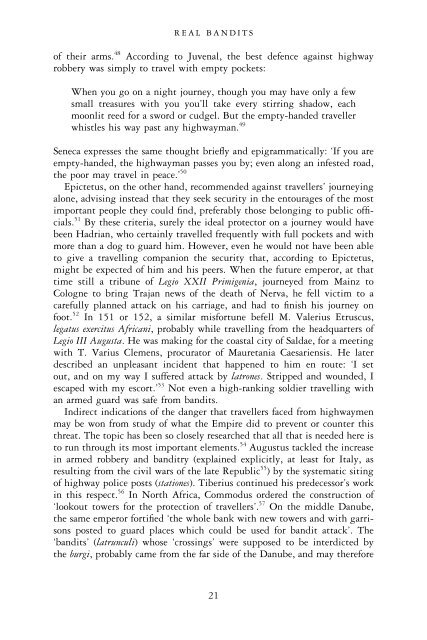Create successful ePaper yourself
Turn your PDF publications into a flip-book with our unique Google optimized e-Paper software.
REAL BANDITS<br />
of their arms. 48 According to Juvenal, the best defence against highway<br />
robbery was simply to travel with empty pockets:<br />
When you go on a night journey, though you may have only a few<br />
small treasures with you you’ll take every stirring shadow, each<br />
moonlit reed for a sword or cudgel. But the empty-handed traveller<br />
whistles his way past any highwayman. 49<br />
Seneca expresses the same thought briefly and epigrammatically: ‘If you are<br />
empty-handed, the highwayman passes you by; even along an infested road,<br />
the poor may travel in peace.’ 50<br />
Epictetus, on the other hand, recommended against travellers’ journeying<br />
alone, advising instead that they seek security in the entourages of the most<br />
important people they could find, preferably those belonging to public officials.<br />
51 By these criteria, surely the ideal protector on a journey would have<br />
been Hadrian, who certainly travelled frequently with full pockets and with<br />
more than a dog to guard him. However, even he would not have been able<br />
to give a travelling companion the security that, according to Epictetus,<br />
might be expected of him and his peers. When the future emperor, at that<br />
time still a tribune of Legio XXII Primigenia, journeyed from Mainz to<br />
Cologne to bring Trajan news of the death of Nerva, he fell victim to a<br />
carefully planned attack on his carriage, and had to finish his journey on<br />
foot. 52 In 151 or 152, a similar misfortune befell M. Valerius Etruscus,<br />
legatus exercitus Africani, probably while travelling from the headquarters of<br />
Legio III Augusta. He was making for the coastal city of Saldae, for a meeting<br />
with T. Varius Clemens, procurator of Mauretania Caesariensis. He later<br />
described an unpleasant incident that happened to him en route: ‘I set<br />
out, and on my way I suffered attack by <strong>latrones</strong>. Stripped and wounded, I<br />
escaped with my escort.’ 53 Not even a high-ranking soldier travelling with<br />
an armed guard was safe from bandits.<br />
Indirect indications of the danger that travellers faced from highwaymen<br />
may be won from study of what the Empire did to prevent or counter this<br />
threat. The topic has been so closely researched that all that is needed here is<br />
to run through its most important elements. 54 Augustus tackled the increase<br />
in armed robbery and banditry (explained explicitly, at least for Italy, as<br />
resulting from the civil wars of the late Republic 55 ) by the systematic siting<br />
of highway police posts (stationes). Tiberius continued his predecessor’s work<br />
in this respect. 56 In North Africa, Commodus ordered the construction of<br />
‘lookout towers for the protection of travellers’. 57 On the middle Danube,<br />
the same emperor fortified ‘the whole bank with new towers and with garrisons<br />
posted to guard places which could be used for bandit attack’. The<br />
‘bandits’ (latrunculi) whose ‘crossings’ were supposed to be interdicted by<br />
the burgi, probably came from the far side of the Danube, and may therefore<br />
21


